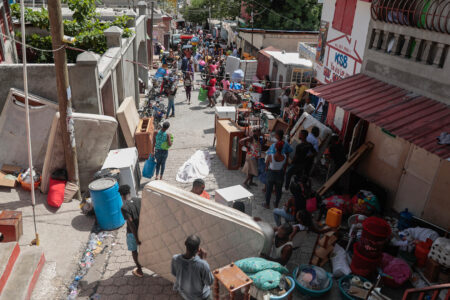
Losing an election is always tough. And especially when it is the second in a row. But Canada’s loss to Ireland and Norway in this past week’s Security Council selection should be kept in perspective.
Make no mistake, the result was a serious blow. Winning that seat was a top foreign policy priority for the Prime Minister. He was personally invested in the effort. He visited Africa in January, and promoted our candidacy in calls to dozens of leaders. It was also high on the foreign minister’s agenda, and engaged our diplomats around the world.
But let’s remember the steep challenges we faced from the outset. We started our campaign late. We were up against two of the best-governed and most highly regarded nations in the world. They declared years before we did, and had pocketed many committed votes before we started campaigning. And yes, they were able to trumpet an exemplary record of global citizenship in everything from foreign aid to peace-making and peacekeeping. That’s some competition! Frankly, the fact that we made it such a close race is a testament to the skill and popularity of our UN Ambassador, Marc-André Blanchard.
But we should not take this disappointing result as a reason to withdraw.
Rather, let’s accept the decision, take it as a lesson, and act on what we just learned. Despite the loss, Canada still enjoys a very positive reputation among member states. But our global performance can be improved. Let’s regroup, conduct a frank assessment of our place in the world, and address whatever frailties we find in Canada’s policies and practices. And in that regard, we have four recommendations.
First, let’s adopt a Canadian foreign policy that is contemporary, cogent and coherent. We’re long overdue for a thorough re-examination of our global priorities and how best to promote them.
In our view, this task should not be left to the PMO, to PCO, or to senior officials. It need not be farmed out to experts outside government. We suggest that it be assigned to an all-party Parliamentary committee, of both the House of Commons and the Senate, created for the purpose. In a minority Parliament, what better way for the government to show respect for all parties, and indeed for its own caucus? What better way to make use of the expertise sitting, for example, in the Red Chamber, with senators such as Peter Boehm, Canada’s former G7 sherpa, and Peter Harder, former deputy minister of foreign affairs, to name just two.
Properly supported by an adequate budget, and with time enough to hear from academics, practitioners and Canadians themselves, we have every confidence that such a committee would return with worthy recommendations.
Second, let’s reinvest in Canada’s foreign policy infrastructure. The Department of Foreign Affairs has for years been among the first targets for governments looking to reduce spending. Its budget has been cut repeatedly by Liberals and Tories alike.
The result? Canadian diplomacy, once rated among the finest in the world, has been diminished — not through lack of talent, but because our diplomats have been required to do everything on the cheap. Let’s make sure that our foreign policy professionals are given the resources to work effectively.
Third, let’s broaden Canada’s efforts to strengthen multilateralism and global governance. We needn’t be on the Security Council to do that. Canada is a member of almost every important club, from the G7 to the G20, from the Commonwealth to La Francophonie, and from NATO to OSCE. We can use our many networks to foster and encourage international cooperation, and perhaps to promote Canadians to lead a multilateral organization. We are under-represented in those roles.
Finally, we talked during the Security Council campaign about the corrosive effect of gross economic inequality among the nations of the world, and about the connection between that inequality and the incidence in developing countries of both armed conflict and infectious diseases.
Well, let’s follow through on our campaign commitment to focus greater international attention on the need to accelerate development in the Global South: broadening access to education, providing decent housing, establishing public infrastructure and improving healthcare.
Perhaps we can start by asking the Parliamentary committee to tell us whether Canada itself is contributing enough to foreign aid, given the size of our economy.
Yes, it hurts to lose an election. But as former politicians, we can tell you that it’s not the end of the world. In fact, maybe we can apply the lesson of our loss to make that world a better place.
Photo: United Nations Headquarters in New York City. Shutterstock/ By Osugi






